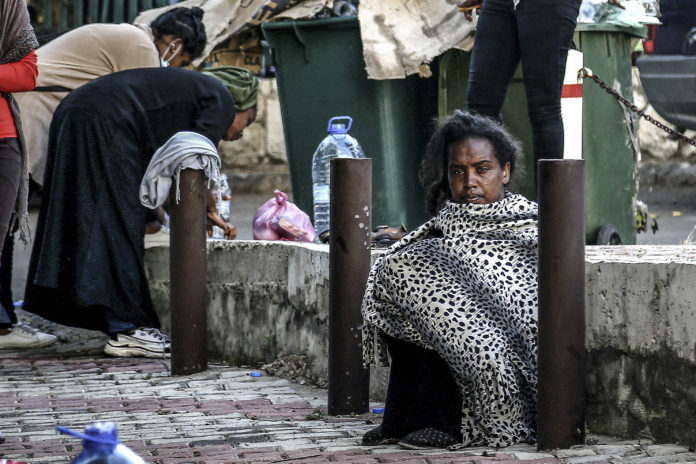The number of newly unemployed Ethiopian domestic workers camped out the front of the Ethiopian Consulate in Beirut continues to grow. Authorities moved around 35 women into a Caritas shelter on June 5 after some spent up to two weeks camped on the concrete outside the consulate.
As Lebanon’s economic crisis persists, more workers are being dumped on a daily basis by employers who can no longer afford them.
A dejected-looking young woman named Lomi, hauling a large black suitcase, is the latest discarded Ethiopian domestic worker to join the growing ranks of mostly women calling for repatriation. The 20-year-old came to Lebanon a year ago to work and support her family, but her employer threw her out on Monday without her passport after she asked for the four months wages they owed her.
Instead of paying up, they bundled Lomi and her big black suitcase into a cab bound for the Ethiopian Consulate, which suspended services on June 3 without explanation.
“What’s going to happen with me tomorrow or after tomorrow?” Lomi told Al Arabiya. “What can I do, where can I go? What am I going to eat and drink? Where is my money from the last four months?” the young woman asked, in tears.
Employers unable or unwilling to pay wages have decided to leave their ex-employees in the hands of the Ethiopian Consulate instead of paying for a commercial plane ticket worth around $680 and the mandatory two-week COVID-19 quarantine hotel stay upon arrival in Ethiopia. The workers, many without passports and no longer with the legal right to reside or work in Lebanon, are now in danger of being penalized by Lebanese authorities.
The more pressing issue for women like Lomi is their lack of shelter, money, and food. Unable to afford flights or find a new job due to the restrictions of Lebanon’s kafala (sponsorship) system, there is no clear path for these women to return home or find new jobs in Lebanon.
“You see these ones? They brought them today with their bags,” said Hanna Tadasa, who herself has been unemployed in six months, pointing to a row of new arrivals at the Beirut consulate.
“Madame, my dear, you have parents. [These women] also have parents in their country. Don’t bring them and throw them outside. Shame on you. We are humans,” was Tadasa’s message for other Lebanese employers thinking of dumping their staff.
Blame game
The Ethiopian Consulate and Department of Foreign Affairs have remained quiet on the issue and now ceased service provision, adding to the abandoned workers’ sense of uncertainty and helplessness.
“Every day they tell us come back on Monday, and when Monday comes there’s nothing,” Tadasa explained. “I want to travel to my country and live in dignity with my family.”
The consulate’s head of communications, Befirde Dengela, broke the silence on Sunday and decried the dumping of workers. According to Dengela, the consulate was forced to close over security concerns as some women “got rowdy” and attacked diplomats, a claim the women deny.
“The employers are to blame. They can’t just throw them out here when they can’t afford to pay,” Dengela told African publication the Mail & Guardian on June 7.
“We have repeatedly asked Lebanese authorities to intervene and hold these employers who abandon these women accountable. But they are slow to do so,” the senior Ethiopian diplomat added.
The high cost of plane tickets and mandatory quarantine mean that although workers desperately want to be repatriated, it is essentially impossible. Lebanese authorities have entered into the blame game, saying they have done what they can for the workers but “the ball is in the playground of Ethiopia.”
“Lebanon’s economy has been hit hard. We did what we could to facilitate the return of these women to Ethiopia by lifting the fines that undocumented migrants would normally be charged,” according to Khazaal. “But Ethiopia refuses to evacuate its citizens.”
As the economic situation in Lebanon shows no signs of improvement, and Ethiopian women continue to either be dumped or flee their current employment situation, the future for them looks bleak. The Ethiopian and Lebanese authorities’ attempts to shift the blame are doing little for the women who are now homeless and hungry, far from home, and with no real hope of repatriation.
Read also: Outcry after Lebanese Facebook Group User Puts Nigerian Domestic Worker Up for Sale





